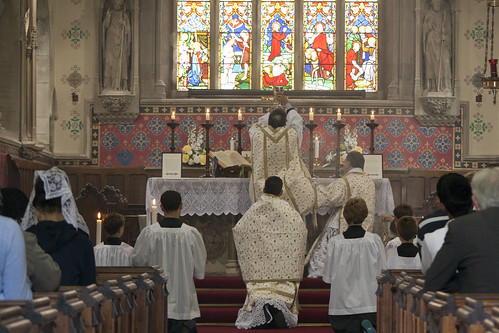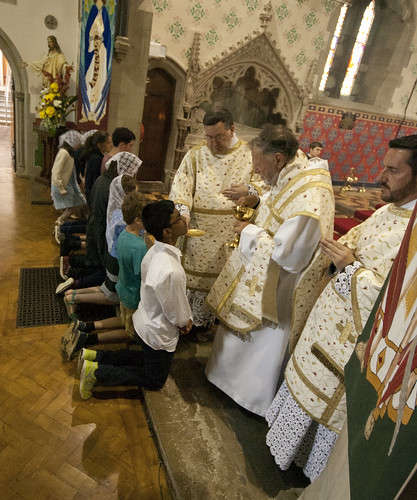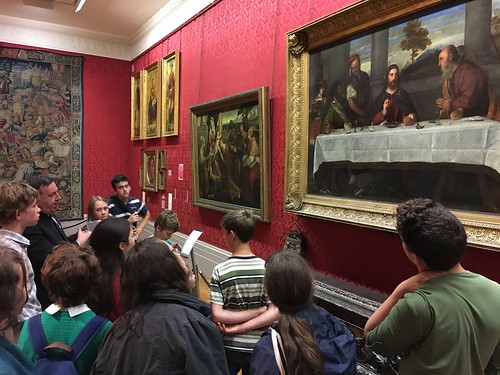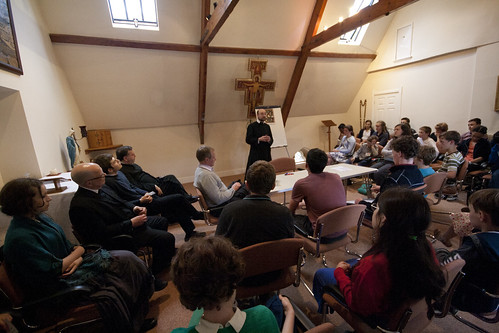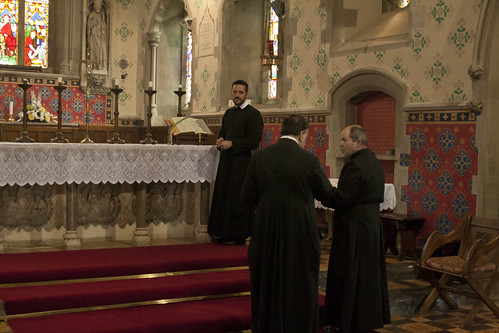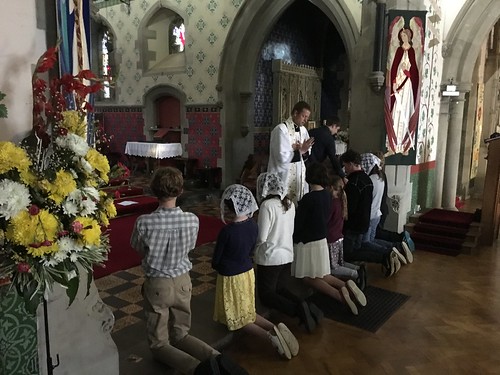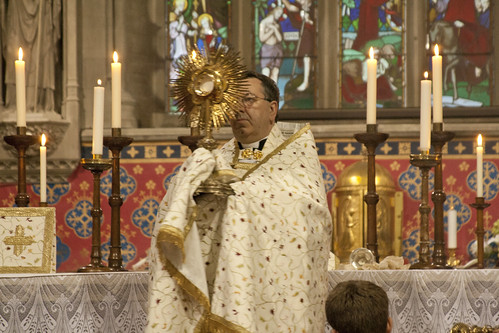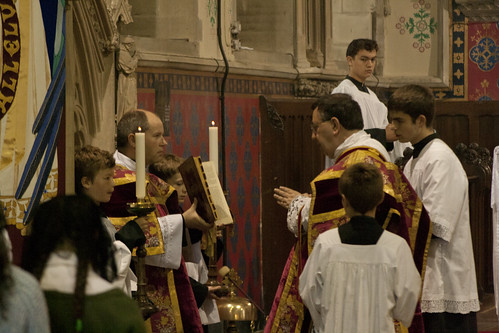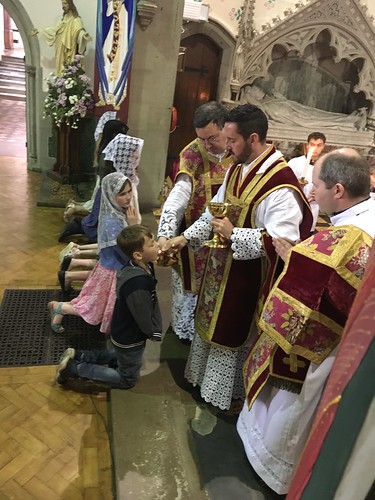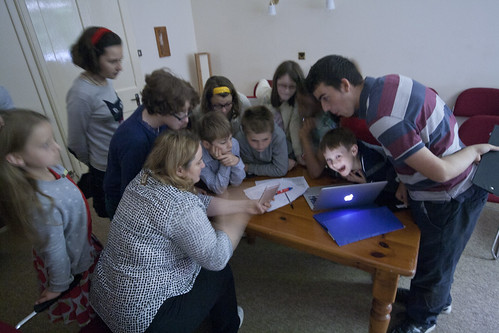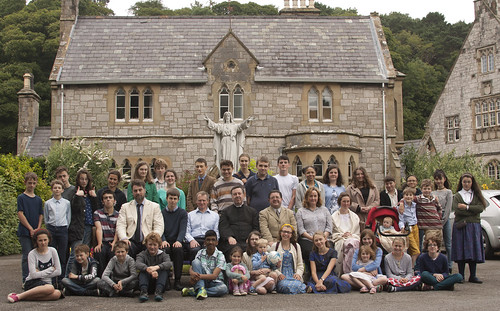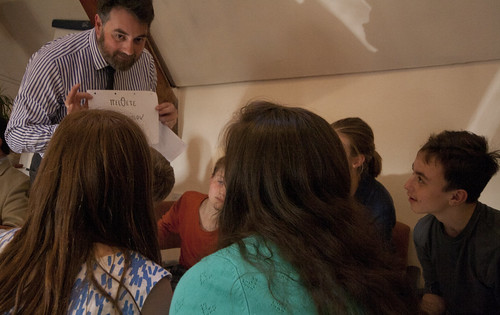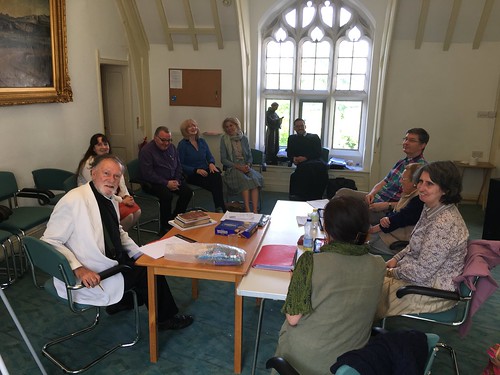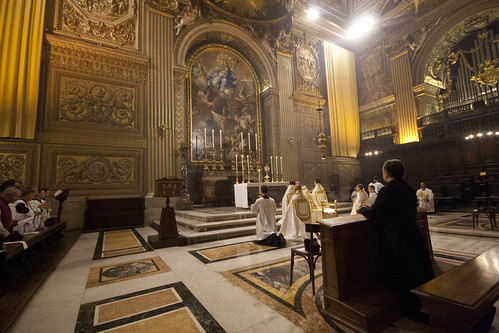Chairman's Blog
Month's mind for Anthea Craigmyle, 18th August
 |
| St Columba, by Anthea Craigmyle |
As previously noted on this blog, I have organised a 'month's mind' Mass for Anthea Craigmyle. All are welcome. At the time of writing I'm still looking for servers, email me via the LMS office if you can help on the day: info@lms.org.uk
Thursday 18th August, 11am: the Little Oratory, at the London Oratory (address: Brompton Rd, London SW7 2RP: click for a map). The 'month's mind', Traditional High Mass accompanied by Oratory singers, who will sing Anerio's Requiem. The 'Little Oratory' is not in the main church, but the other side of the small car park.
In addition to this, I can also now announce:
Wednesday 2nd November (All Souls Day), 5:30pm, Our Lady of the Assumption, Warwick Street, W1B 5LZ (click for a map). Traditional Latin Vespers of the Dead, with polyphony (Viadana and Palestrina) provided by Cantus Magnus. This will be offered for all the deceased members of the Craigmyle family.
This Vespers has been timed to fit in with the annual Craigmyle Memorial Lecture organised by the Catholic Union. This is an invitation-only event, within easy walking distance from Warwick Street, at 6:30pm.
These are public services, everyone is welcome to attend.
I would like to reiterate my thanks for the many Masses offered by our priest friends. We are truly blessed in your generosity.
Support the work of the LMS by becoming an 'Anniversary Supporter'.
Romanticism, Feminism, and Misandry
 |
| O what can ail thee, knight-at-arms, alone and paleley loitering? (La Belle Dame) |
This is a little interjection into my series on Callum Brown's thesis that religion became feminised in the 19th century.
Callum Brown writes (The Death of Christian Britain):
As femininity and piety became conjoined in discourse after 1800, the spectre arose of masculinity as the antithesis of religiosity. From the sixteenth to the eighteenth centuries, a wife's femininity was perceived as a threat to piety and household, and a husband established his moral status by controlling her. From 1800 to 1950, by contrast, it was a husband's susceptibility to masculine temptations that was perceived as a threat to piety and household, and the wife established a family's respectability by curbing him. Exemplars of piety changed sex, from being overwhelmingly male to being overwhelmingly female, and the route to family harmony no longer lay in the taming of the Elizabethan shrew but in the bridling of the Victorian rake, drunkard, gambler and abuser. (p88)
During 1887 and 1888 the religious newspaper the British Weekly published some forty articles on 'Tempted London', a series concerned with the moral condition of men and women in the capital. Men and women were dealt with separately - men during the first thirty articles, women in the last ten. The nature of moral weakness in the two sexes was conceptualised very differently. The articles on women were organised on the principle that occupational exploitation corrupted women. ... The iniquity of the trades in which the women worked were studied in detail, focusing on low wages, home working, long hours and the exploitation of employers and merchants. ...The women themselves were not deemed 'immoral', ... but as victims ...
...The men's articles were organised around three headings: drink, betting and gambling, and impurity. The venues for each temptation were studied in detail... (p89)
Brown's focus on the role of gender in religious change forces us to confront something which is not far below the surface in a great deal of Victorian fiction: the Romantic exaltation of the female, and contrasting, jaundiced, view of masculinity. There are a number of things which I think need to be absorbed from this in any discussion of gender in the Church today.
First, this view of women is not an intrinsic part of Christianity. A very different view prevailed before 1800. The similarity with medieval Chivalry is superficial. Romantics liked to refer to Chivalry, but not only can the two movements not be rolled together as 'the attitude before Feminism' (as they were separated by three centuries), but they are quite distinct in content. As I have noted on this blog, Chivalry did not deny women's sinfulness, nor did the Chivalric ideal stop men exercising authority over rebellious women.
Second, the pre-1800 view of women Brown describes is specifically Protestant. There are of course aspects of Catholic thought and culture which provide parallels, but Protestants were perfectly aware at the time that Catholics had a broadly contrasting view of things, and created a picture of Catholicism as effeminate, soft, and indulgent, as a polemical response, a picture which, remarkably, survived some decades after Protestantism's own flip into femininity.
I realise that this is going to sound parti-pris to non-Catholic readers, but it really does look to me as though Catholic culture was able to maintain a reasonably balanced outlook on gender as Protestant culture veered from one extreme to the other: from misogyny to misandry.
Third, and this is the most surprising but also the most undeniable aspect, we can't blame Feminism for the misandry found in Evangelical and other religious circles today. The Evangelical blogger Dalrock likes to examine the extraordinarily unbalanced treatment of men and women by conservative evangelicals in the USA, a treatment with echos in the Catholic Church, but what they sound like is exactly what their predecessors sounded like in the 1880s.
Fourth, this sheds a very interesting light on Feminism. Feminism is (among other things) a reaction against the distorted conception of femininity which Romanticism built up - women being made of glass, having no sexual appetites, having no legitimate ambitions outside the home, etc. etc. - but feminists are not so eager to jettison the feminine moral superiority which was part and parcel of that conception.
Feminists regard the women of the 1950s and earlier as in need of 'liberation'. A new vocabulary is required, however, to describe the abject enslavement and denigration of the men of that era: chained to brain-numbingly tedious and meaningless industrial or clerical jobs, when they weren't being mown down in brutal wars, and told, for their pains, that they were intrinsically wicked and that all their favoured pastimes were wrong. Who was going to free the men?
The take-home message I'd like to convey to the readers of this blog is this: that it is a mistake to attempt to deal with Feminism, whether that is imagined as opposing it or in some way coming to terms with it, by appealing to Romanticism - by rolling back one's conception of femininity to 1955. This is what I see both the cod-Chivalric movement and the Alice von Hildebrand / Theology of the Body movement as trying to do. The reality is that insofar as Feminism rejects Romanticism, in its angelic conception of femininity, it is right to do so, even if it is unable replace this conception with a better one. Insofar as Feminism accepts Romanticism, in its view of women as morally superior to men, it is wrong.
In many ways I appreciate Romanticism. Romanticism as a movement opposed important errors, and was responsible for great artistic achievements. But it is not the route out of our present morass.
Support the work of the LMS by becoming an 'Anniversary Supporter'.
Was religion feminised in the 19th century? Part 2: Romanticism
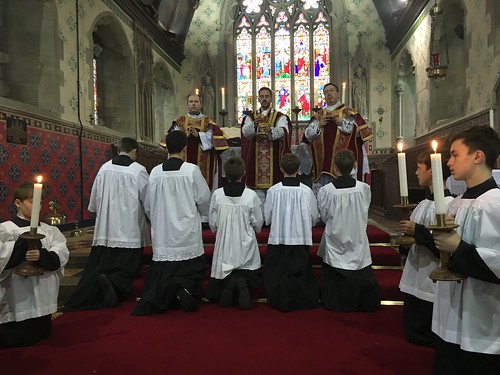 |
| Clergy and servers at the Ecce, Agnus Dei in High Mass at the SCT Summer School. |
In the last post in this series I set out the thesis of Callum Brown (in his The Death of Christian Britain): that around 1800 religion began to occupy the feminine realm, with men being described as 'heathens', male pastimes regarded with suspicion, and femininity and religiosity being understood in terms of each other: to be feminine was to be religious, and to be religious was to be feminine. This state of affairs carried religion in the UK - the focus is on Evangelical Protestantism, understood in a broad sense - for 160 years, with considerable success, with indicators of religious practice and affiliation rising throughout the 19th century and, in the 20th, recovering strongly from the disruption of the two World Wars.
Brown has nothing to tell us, however, as to why religion took this surprising turn in 1800, or why this 'discourse' suddenly collapsed in the 1960s. Nor does he have anything to tell us about how the Catholic experience differed. At one point he says that Catholic attitudes were very similar to Evangelical ones. Well, up to a point. I want to deal with the first question in the post, and the second in the next, after a short intermission.
The feminisation of piety at the turn of the 18th and 19th centuries is, on the face of it, surprising, because as the feminists remind us, Christianity is a patriarchal religion. It was led by male preachers and clergy in the centuries before 1800, and this continued after 1800. The Protestant critique of female delinquency before 1800 was very marked: indeed, to say it represented a lack of balance would be an understatement. An interesting side-issue Brown notes is that women were preserving vestigial Catholic rituals, notably 'churching' after childbirth, which were condemned as superstitious. So what happened?
Looking at the wider intellectual and cultural situation, the change is not so difficult to understand. What happened at the end of the 18th century is the rise of the Romantic movement, and the model of female piety at work in Evangelical circles after 1800 is a recognisably Romantic model. Romanticism has a complex relationship with the (rest of the) Enlightenment, but at least in popular terms it can be seen as a reaction against Enlightenment Rationalism. It emphasises the role of the emotions, it privileges spontaneity and authenticity over formalism and the intellect. Rationalism was not friendly to religion in the 18th century, and the arrival of Romanticism was in many ways a relief for Christian thinkers, even if it wasn't exactly orthodox itself. It was a particularly good fit for Christians at the 'Low Church' end of the scale, who had always minimised ritual and emphasised religious emotion and subjectivity. It is not surprising, therefore, that they allowed themselves to be influenced by it.
The Romantic reading of Rationalism was that Reason is masculine and was destroying the world; emotion and authenticity and love are feminine and can save the world. This is very clear in Romantic fiction, such as Goethe's Faust, in which the innocent and self-sacrificing Marguerite saves the dried-up intellectual Faust. (This is a complete innovation in the Faust story compared to Marlowe's 16th century version.) Examples could be multiplied. Female heroines abound in the folk tradition, of course; what is new is the idea that females will save the day simply by being female, which is to say, by being emotional, irrational, feeble, self-sacrificing, spontaneous, and so on. It isn't the mulier fortis who saves the day - it's not Joan of Arc - it's the shrinking violet. As well as putting femininity to the fore, Romanticism gives us a very specific, and problematic, conception of femininity.
With what level of self-consciousness I do not know, but under this influence Evangelical writers stopped talking about rebellious, superstitious, over-emotional females, who needed to be kept in check by restrained, upright men, and started talking instead about sweet, quiet, pious females, who themselves needed (gently, of course) to keep in check the rough, rebellious, drinking/ gambling/ womanising men. What happens is not just a reappraisal of the relative merits of the sexes, but a new conception of what it is to be pious. Being pious became understood in feminine terms. To be truly feminine, a woman had to be pious. To be pious, a man had to take on female qualities, and restrain his masculine ones.
Brown shows that as the 19th century wore on, the problem of putting men off religion was noticed among evangelicals, and 'muscular Christianity' in the mid 19th century was a response to this. It held up King David as a model for boys, and tried to use sport as a way of allowing boys and men a masculine outlet. Unfortunately sport was itself attacked by other evangelical voices. We can add to this the Public School movement, or the more idealistic end of it, which at precisely this moment incorporated sport as a key element in a masculine Christian environment, and the Anglo-Catholic movement, with its emphasis on ritual and reason - this of course it had its own public schools. These latter two phenomena are missed by Brown's focus on the evangelicals, but his point remains that even together they did not overturn the basic conceptual shape of Christian discourse, or the emphasis on masculine sins. Indeed, I'm not sure how clearly they saw the problem, and how explicitly they strove against it. In his verse autobiography, Summoned by Bells, Betjman recalls the boys being told, in his grim pre-Great War public school, by a visiting old-boy Anglical bishop, 'Never do anything of which your mother would be ashamed'. The public schools may have been masculine in terms of staff, they may have had military-style discipline and plenty of rough sports, but they generally failed to offer their pupils a non-sissy spirituality.
All this time, evangelical activists were trying to close public houses, keep off-course gambling illegal, stop boys playing football on Sundays, and get men to kneel down and weep for their sins in public. Brown quotes a female activist lamenting the difficulty of getting soldiers at Aldershott to express religious emotion. 'Many a man would rather encounter the enemy's fire in open line, "than be laughed at in the barrack-room".' That, dear reader, is precisely the problem.
The next question is: was this equally a problem for Catholics?
A little footnote on off-course gambling, which was illegal but still widespread in the late 19th and early 20th centuries. I came across a fascinating discussion of this which made the case that, as commonly used, it was actually a form of saving for working-class families. Mathematically-minded fathers of families would make careful study of 'form' (of racehorses), and every week place a very small wager on an 'accumulator' bet. This is a type of bet which uses the proceeds of one successful wager as the stake in a bet in another race, and the proceeds of that on another, and so on. The odds against winning the whole thing are huge, but so is the reward if you do. So, from this small weekly outlay, there would occasionally come in a tidy sum, like £5, enough to pay for a daughter's wedding. For people without easy access to the banking system, and subject to constant temptations to fritter away savings before they've matured, this is actually a perfectly rational approach to paying for occasional big-ticket items, conceptually very similar to the 'Christmas clubs' and the like common at the time, but also an intellectual challenge and a lot of fun. Blanket opposition by evangelicals to gambling, like blanket opposition to the demon drink, was really wrong-headed.
Support the work of the LMS by becoming an 'Anniversary Supporter'.
Was religion feminised in the 19th century?
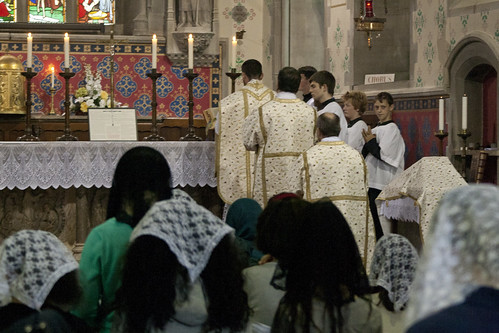 |
| Young ladies at the Summer School attending High Mass |
A good deal has been written on the feminisation of the Church, and of all Christian denominations, since the 1960s. In the Catholic case, there are a number of easily-identifiable markers which date to the liturgical reform and the following decades: the loss of silence, ritual, and reverence, the preoccupation with community, emotion, and spontaneity, and the filling up of Catholic sanctuaries with altar girls, female lectors, and Extraordinary Ministers of Holy Communion, while parish ministries such as looking after the 'children's liturgy' and catechism are run almost exclusively by women.
This is the picture we get from the American Jesuit sociologist Patrick Arnold, and English Dominican sociologist Anthony Archer, about both of whom I've written on this blog. The statistical evidence for the female domination of congregations and parish ministries come from the highly respectable CARA in the USA and the British Social Attitudes Survey in the UK. Leon Poddles, another author who has written on the problem, by contrast locates the key moment of feminisation with the rise of bridal mysticism in the high Middle Ages. I've also discussed this, and the extent to which he has a point. I've just finished reading a more recent expert treatment, The Death of Christian Britain by Callum Brown, which focuses on the evangelical British experience. (Hat-tip to the Evangelical blogger Alastair Roberts who recommended the book in a comment on this blog.) Brown is extremely interested in gender, and locates a key turn of religion into the feminine realm at the turn of the 18th and 19th centuries: around 1800. His book is so helpful and interesting, even though I disagree with some important points in it, that I want to clarify my own thoughts by means of a few blog posts about it.
Brown is interested above all in 'discourse' as a source of data. So he looks at religious tracts, fiction, autobiography, obituaries, and oral history archives. He wants to understand how people saw themselves and each other. The main thesis of the book can be summarised in a few points.
First, before 1800, women were 'religiously problematic'. They needed to be criticised and controlled. It isn't hard to think what Brown has in mind. Going back to the 16th and 17th centuries, in Evangelical (Puritan) contexts, we see a great deal of concern about women, and a great emphasis on the importance of male leadership. Brown says disappointingly little about this period, because he starts his study at 1800, but we need to establish the contrast. Just think about witch-burnings. The alleged witches were women (with, I think, few exceptions); this is the monstrous tip of a very large iceberg of focus on female depravity, which carried on for a good while after the burnings stopped.
Second, after 1800, men were 'religiously problematic'. This may seem surprising, but the case Brown makes is overwhelming. The focus of religious tracts, obituaries, etc. etc. is not on female vices, but male ones, above all drinking and gambling. Female vices cease to be mentioned. Were there any, you ask? The elephant in the room was prostitution, which 19th century evangelical activists steadily ignored. The 19th century evangelical model was for a sinner to repent, with tears, and although such display of emotion might come more easily to women than men, a good evangelical man really had to go through this process, while for women it was not so necessary. The stories they told about men and women didn't include 'conversion' for women, because they didn't need it. On the other hand, men were by nature 'rough', inclined to promiscuity, drink, gambling, and a neglect of their religious duties. Particularly on Sundays, good men and boys had to behave like women: 'rough' and active sport and games were forbidden; reading and walking were allowed. Boys and girls were put into elaborate 'Sunday best' which the girls loved and the boys hated.
Third, for all the criticisms one might make of this religious ideal, the 19th century saw an awe-inspiring effort of evangelisation of Britain, and a steady rise in indicators of religious practice and affiliation. One of Brown's most striking theses is that this period, of urbanisation and industrialisation, was not a period of secularisation. One point he makes is that official statistics from the early and mid 19th century understate urban church-going by a big margin because the data-gatherers missed the more informal and ad hoc worship going on by evangelicals in new urban centres. The 18th century, for a number of reasons, was not a good century for British religion, but in the course of the 19th century the penetration of religion into the lives of the population went probably about as high as it was possible to go. The two world wars disrupted things, but in the 1950s a major religious revival took things back to a level not much lower than the peak at the beginning of the century: on some measures, higher.
Fourth, religious self-understanding changed somewhat in the early 20th century. The huge efforts of the temperance and anti-gambling movements collapsed, taking the heat out of the call to repentance. Instead of getting (or at least waiting for) their men to repent, women were now simply to create the ideal home environment ('the angel in the house'), as well as upholding religious practice. Church-going declined somewhat, partly because of the decline of 'twicing': going to church twice on a Sunday (morning and evening). On the other hand, affiliation continued to rise, as indicated by the steady rise in the number of religious solemnisation of marriages (peaking at well over 90% of all marriages in Scotland), baptisms, confirmations, and so on. It was necessary for respectability, particularly female respectability, to be a believer, even if church attendance was irregular, and denominational allegiance flexible. People sent their children to Sunday School even if they didn't attend church themselves.
Fifth, religious 'discourse' collapsed spectacularly in the course of the 1960s. That is to say, the idea, found in popular magazines, songs, and autobiographies, that the goal of life necessitated religious belief and some degree of practice. The self-understanding of young women, in particular, which had involved notions of respectability, religiosity, and feminity, tightly woven together, dramatically changed, to a secular notion of self-fulfillment.
One difficulty in assimiliting and critiquing Brown's thesis is that the Catholic experience during this period partly follows the same pattern, and partly diverges from it. In the second edition Brown acknowledges the criticism he received for treating Catholicism, and other non-evangelical strains of Christianity, as if there were (in the phrase of a reviewer), just another form of 'conversionism'.
Another is that Brown's idea of giving an explanation of changes, is to point to the 'discourse'. But the change of discourse does not explain anything. For one thing, changes to the discourse reflect changing attitudes and practice as much as they drive them. They simply reflect each other. For another, even if we thought that discourse was in some mysterious way causally prior, we would want to know why the discourse changed. It might be that the discourse changed by a process of natural, internal development, but if so Brown doesn't explain this. But as well as following its own developmental logic, it would also be natural to explain changes in the discourse in terms of external factors, whether from other aspects of the history of ideas, or economics, or something else.
At the end of the 'Postscript' to the second edition, Brown becomes rather excited by the idea that women spontaneously threw over the traces of religious constraint in the 1960s, and that this act was feminism. The idea that feminism didn't derive from elite theorists is, of course, demonstrably false, as Brown would surely realise if he stopped to think. But we still want to know why women chose this moment to listen to elite feminists.
Just to illustrate this, a standard story told about the 1960s goes like this. The post-war baby boom combined with the prosperity of the 1960s put money into the hands of a very large number of young people. This, combined with modern means of communication (radio and television), and products (popular music, manufactured clothing, cars, etc. etc.) created for the first time a market made up of the monied young, with all the advertisers and producers wanting to promote themselves in this new market. This meant that young people no longer entered adulthood impecunious and numerically insignificant, with the high-status, desirable things in their lives being the things which their parents had developed and held dear. The young people of the 1960s didn't need to grow up: they didn't need to imitate their parents. This made rebellion, and subsequent social transformation, possible.
If true - and I think there is a good deal of truth in it - this still isn't the whole story. It tells us how a space opened up for rebellion and change, but these factors didn't necessitate it, and nor did they determine the form it would take. Callum Brown has nothing to say to help us here, or on the earlier transformation at the beginning of his period. With the help of other authors, I think I can fill in some of the gaps.
Support the work of the LMS by becoming an 'Anniversary Supporter'.
SCT Summer School 2016: photo essay
This was the tenth Summer School run by the St Catherine's Trust. Numbers have been increasing over the last several years, and we are now close to capacity with 35 students.
Fr John Hunwicke, the celebrant above, and Fr Richard Bailey of the Manchester Oratory, were present for most of the week teaching the Latin Mass Society's residential Latin course, with Fr Andrew Southwell, the Summer School's chaplain.
One highlight of the week was a visit to the Walker Art Gallery in Liverpool, which has an impressive collection of Medieval and Renaissance art, and some superb Pre-Raphaelites.
Fr Anton Guziel of the Birmingham Oratory gave us an evening talk, on St Philip Neri.
One of the students on the Latin course was a priest from Dublin, Fr Adrian Kieran, who learnt the role of sub-deacon at High Mass as a bonus.
One of the optional activities was sewing. The project this year was embroidered brown scapulars.
Another evening talk was given by the recently ordained Fr James Mawdsley FSSP, was is now based in Warrington. He gave us 'first blessings'.
The end of school quiz. Yes, they learnt a bit of Greek.
The Latin Course students with their tutors for a final feedback discussion.
Support the work of the LMS by becoming an 'Anniversary Supporter'.
The results of persecution
Reposted from October 2009. The coming persecution, whether by militant secularists or Islamists, will not be a lovely time of growth and development. It will be horrible.
----------------
Last night I went to the annual Craigmyle Memorial Lecture, hosted by Jim Dobbin MP on behalf of the Catholic Union and given in Portcullis House. This year the speaker was HE Francis Campbell, the first Catholic to be Britain's Ambassador to the Holy See, and still in office. He gave a thoughtful talk on Pope Benedict's conception of Europe and secularism.
An interesting discussion took place during the questions about the effect of persecution on the Church. One questioner was saddened and disillusioned that the church in the Czech Republic, having been active in opposing the Communists, had, since Communism fell, become rather an insignificant force in what is said to be the most secular country in Europe. Another questioner suggested that the reason for the decline in the Czech church was that it was no longer being persecuted.
Mount Grace Priory, a Carthusian house (more photos).
Having been to Yorkshire recently I can show exactly what persecution, when at all effective, usually does to the Church. It makes a ruin of its institutions, and most of its members apostatize. Of the Yorkshire Cistercians in the four great Abbeys there only one, George Lazenby of Jervaulx, gave his life for refusing to assent to the manifestly absurd claim (which even Queen Elizabeth did not revive) that the monarch was the Head of the Church.
Byland Abbey, Yorkshire, Cicsterian (more photos).
In Poland the result of the persecution, to leave aside the most obvious, the horrific sufferings of Catholics under the Nazis and Communists, has been the agonising on-going revelations of the treachery of one after another respected prelate. The effect on the minds of the ordinary people of more than a generation of unquestioned anti-Catholic propaganda will take at least another generation to undo, and probably far longer.
Yes, certainly persecution gives us martyrs, but anyone who thinks that it unites the Church clearly hasn't read any history: the early Church was riven by heresy during persecution; persecuted English Catholics under persecution were bitterly divided about both strategy and leadership, divisions cruelly exploited by the persecutors.
And yet there are still people looking forward to what appears to be coming - a increasingly shrill persecution of Catholicism by the British state - as if to a lovely warm bath. But it won't be lovely. It will be horrible. Without institutions, whether they be adoption agencies, charities, or schools, the Church is maimed: she cannot spread the gospel or undertake her characteristic works of love towards all effectively. So the first thing which will happen is that the Church will cease to be able to make visible to society at large what the gospel means in practice.
Byland Abbey Chapter House.
The next thing that will happen is apostasy. Lukewarm Catholics who find professing their faith embarrassing or even a danger to their jobs will cease to do it, and will fall away from the faith. Fervent Catholics will be more and more cautious about doing it, and will tend to become lukewarm. No one will hear Catholics witnessing to their faith and conversions will fall.
After that we can expect increased internal divisions. Catholics always have their disagreements, but a situation of chronic pressure from outside creates a feeling of desperation, which is expressed in ill-considered but emotional support for conflicting plans and leaders.
Rievaulx Abbey, Yorkshire, Cistercian (more photos).
Sociologists will tell you that isolation and persecution leads to radicalisation. This is the fervour which those looking forward to persecution are hoping for. But it can more easily be wrong-headed radicalisation which grows, rather than the admirable kind, in a situation where the institutions of Catholic education and informed debate have been destroyed.
An extraordinary air of whimsy and presumption pervades the air when persecution is discussed. Are the Catholics of today more ready for rack and rope than the Catholics of 1535 or 1939? I don't think so.
Rievaulx Abbey, Monks Refectory
Look at the last two pictures above: this is the achievement of St Aelred of Rievaulx, one of the greatest spiritual writers of his age, who created one of the greatest religious houses of England. What is it now? A pile of stones whose visitors scarcely know what God Aelred worshipped.
Appeal to Cardinals: text revealed
In light of the appearance of the signatories and the text of the Appeal to the Cardinals online, the organisers of the appeal are issuing a press release, below, for immediate release.
The appeal and its covering letter can conveniently be seen here.
I will be continuing to act as spokesman for the group, and will be happy to answer questions.
Dr Joseph Shaw
appealtothecardinals@gmail.com
Press release – Publication of theological critique and accompanying letter sent to the cardinals and patriarchs
The National Catholic Reporter of Kansas City, Missouri, recently published, without authorisation, the names of the signatories of a letter to the College of Cardinals and Eastern Patriarchs; equally without authorisation, The Australian, an Australia-based newspaper, has recently published the full text of the letter and the accompanying document. The latter is a theological critique of the apostolic exhortation Amoris laetitia, and requested that the cardinals and patriarchs petition Pope Francis to definitively and finally condemn certain propositions. In order to protect the signatories and the critique from misrepresentation, the organisers of these documents wish to offer some further comment and explanation of them.
As explained in previous statements, the organisers did not make these documents public, since they are addressed to the Cardinals and Patriarchs, who would ideally have been allowed to consider them without the distraction of public controversy over the documents.
The critique is the work of a number of Catholic scholars who were concerned that Catholics might understand some passages of Amoris laetitia as contradicting the doctrine of the Catholic faith. The remedy for this danger is an authoritative and final statement by the Supreme Pontiff stating that these understandings cannot be held by Catholics, and that Amoris laetitia does not present them as magisterial teachings or require that they be believed. The college of cardinals has the function of advising the Pope. The patriarchs of the Eastern Catholic churches also have the right and responsibility to advise the Supreme Pontiff on this matter in virtue of the importance of their office. Accordingly a document was drafted setting forth the gravest dangers of the text of Amoris laetitia and sent to the cardinals and patriarchs, along with a letter requesting them to petition the Pope to condemn the errors at issue.
The dangers to the faith found in passages of Amoris laetitia, in light of the ways they can be understood, are indicated by the application of theological censures. Theological censures are terms that identify the precise character of a threat to faith and morals that is found in an assertion. The various censures used in the document refer either to the gravity of the error found in a statement, or to the harmful effects that are liable to result from it. The censures in the critique are purely doctrinal and not juridical in nature, as the signatories do not claim or possess the authority necessary to impose juridical censures. They do not question the personal faith of Pope Francis or claim that he assents to the propositions censured. This is shown by the purpose of the document, which is to obtain a condemnation of these propositions by the Pope. The censures are intended to advise the cardinals and patriarchs, and their authority comes from the Scriptural and magisterial texts that are cited to justify them. Censures of this kind may be assigned by any person in the Church who has the knowledge, role, and mission needed to teach concerning questions of faith and morals.
The censures and the references given to justify them are based on the Catholic understanding of faith and divine revelation. According to this understanding, if a statement is proposed by the Church as requiring the assent of faith (the most authoritative level of teaching), that statement is not a human interpretation of a divine act or teaching, but is a statement made by God Himself. Such statements are formulated using languages and concepts belonging to human cultures, and are taught by the Church in particular historical circumstances. But these languages, concepts, and circumstances do not in any way alter or distort the truths that God asserts. They are used by all-powerful divine providence to express precisely the meaning that God intends to communicate. It is the signatories’ earnest hope and prayer that the cardinals and patriarchs will speak out against the errors that their critique addresses, and that the Holy Father will authoritatively condemn these errors.
ENDS
Support the work of the LMS by becoming an 'Anniversary Supporter'.
The Traditional Mass and Ecclesiology
Basil Loftus has circled back to his story about Cardinal Benelli in his latest column in the Catholic Times, so I thought I'd repost this response to it from April 2016
-------------------------------------
 |
| Giovanni, Cardinal Benelli |
Thanks to the archives of the FIUV, I can shed some light on something mentioned by Mgr Basil Loftus in a column I discussed the other day. He'd picked up the claim that Cardinal Benelli had once said to the President of the Una Voce Federation (FIUV), Dr Eric de Savanthem, that there was a connection between the Traditional Mass and ecclesiology. (Contrary to Loftus, Benelli was actually made a cardinal the year after this meeting, in 1977.)
I noted that Lofus didn't cite a source for this: when one realises what his source is, it is easy to see why he'd rather his readers didn't know. Here is a longer extract: I've emboldened the words quoted verbatim by Loftus to the hapless readers of the Catholic Times on 27th March.
When the President of Una Voce at an interview with Archbishop (now Cardinal) Benelli in Rome in October 1976, pointed out the existing liturgical chaos and asked how, in view of this state of things, the suppression of the old Mass could be justified, he was told that “those who wish to retain the old Mass have a different ecclesiology.” This from one of the closest advisors of the then Pope; it meant that those who were faithful to Catholic tradition were now to be treated as dissidents. The phrase quod semper, quod ubique, quod ab omnibus (“What has been believed always, everywhere, and by all”) as a criterion of orthodoxy bad now been rejected in favor of a new Party Line which contradicted the Church’s entire previous tradition. What was forbidden and condemned yesterday becomes lawful today, and mandatory tomorrow. What had always been seen as black, is now white, and vice versa─because the Party says so. This comes close to the Bolshevik criterion of morality: what is right or wrong is simply what helps or hinders the Party.(Source: SSPX USA District)
This is an old article (first published in 1982) by a certain Fr. Wrighton. It is easy to see why the SSPX might want to make this point, and it has often been noted that radical liberals have something in common with the more radical proponents of tradition, in stressing the discontinuity between before and after the Council. What I've never seen before is a liberal actually using verbatim arguments from what they claim are their most extreme opponents, to make this point. Unlike the SSPX, however, Loftus is embracing a position whose implications he cannot deal with. Because if there really is this discontinuity, he cannot go on to claim that traditionally-minded Catholics should submit to every jot and tittle of the new regime, because, on his analysis, the new regime has no genuine authority, and in any case he doesn't accept its authority himself. If every Pope up to 1962 was a fool and even a heretic, there is absolutely no reason to pay any attention to the Popes since 1962, any more than Loftus does in fact pay attention to the Pope Paul VI's teaching on contraception or Pope Benedict's promulgation of the new English translation of the OF Missal.
However, Fr Wrighton and Mgr Loftus has both got the wrong end of the stick. As I have discovered, Cardinal Benelli's argument wasn't that theology embedded in the Old Mass had been overturned by Vatican II. It was rather that the desire for the Old Mass when the Holy Father does not want you to desire it is wrong.
Here is an extract from Eric de Savanthem's own summary of the interview, in a letter which he sent to Benelli after it took place. This letter and subsequent correspondence was later circulated to members of the FIUV. The date of the letter (not the meeting) is 26th October 1976; the emphasis is mine.
Your Excellency has urged us to espouse as a matter of conscience the new forms of the Church's public cult, promulgated in the course of these last years by "the Apostolic See and the episcopal conferences, under the authority of the Holy Father conferred by Christ". You have reminded us of Our Lord's words; "What you shall bind on earth shall be bound in heaven", "Graze my sheep", "Confirm your brethren", and you insisted on the point that, for the government of the Church, Christ had given to Peter and to his successors a "charisma" which is to be considered as a gift both unique and indivisible. Although the character of irreformability only attaches to definitions, promulgated ex cathedra in matters of faith and morals, the assent due to the acts of the Sovereign Pontiff ought equally to express itself in humble obedience to those of his acts which merely concern the discipline or other nondoctrinal aspects of the government of the Church. For there also, you said, it is the same one and indivisible charisma which guarantees that all these acts cannot but be ordered towards the true and certain good of the Church. Consequently, you could only consider as reckless and irreconcilable with a proper ecclesiology all demands or initiatives which implied that the utility of such and such an act of government duly promulgated by the reigning Pontiff or under his authority could be a subject of discussion or even contestation.
Cardinal Benelli does not dispute the accuracy of this summary in his response. What it amounts to - as Dr de Savanthem goes on to explain at some length, though not in these terms - is an extreme Ultramontanism, the view that imbues the reigning Pope's prudential decisions with something close to infallibility, and his wishes with a force approaching that of Divine Law. As Benelli explains in his response to de Savanthem:
You reiterate unceasingly the same arguments to withhold in effect compliance with that which is clearly wanted by the Church and by the Holy Father himself: the loyal and trusting adoption, by all the faithful of the Roman Rite, of the rite reformed under his authority and in application of the orientations laid down by the Council.
'The Holy Father wishes it!' Then, it would seem, the matter is closed.
Can liberals use this criticism of de Savanthem and the FIUV back in 1976 as a stick to beat us with? Hardly. Loftus can't bring himself to accept the authority of the Pope when it is applied to matters which are quite genuinely within its purview, as I've already noted. There is no question of him and his like of accepting liturgical legislation, like the new English translation of the OF Missal, not only as binding, but even as ruling out any further discussion.
The liberals take an extreme position in rejecting the authority of the Pope and the Church - except in the most opportunistic and inconsistent manner, as when Loftus criticises Pope Benedict for not following the norm of the General Instruction of the Roman Missal which says nothing on the Altar should impede the congregation's view.
Some neo-conservatives take an opposite extreme position, in extending the authority of the Pope to absurd lengths, and Benelli's authoritarianism is an example of this.
Catholics attached to the Church's traditions have long upheld the only sensible position: that the authority of the Holy See is real, but has its limitations. We aren't bound to believe everything the Pope says, when it isn't framed as teaching of the Church, nor are we bound to do everything he wishes, when his wishes are not promulgated as canonical obligations. But when he does exercise his authority, then that must be accepted. As I pointed out when addressing a similar argument from the progressive liturgist and composer of ghastly hymns, Paul Inwood, even when there may be some ambiguity, as there long was over the legal status of the Traditional Mass, the policy of the FIUV and the Latin Mass Society alike was not to throw caution to the winds and do what we wanted, but with reason and respect to make the case for our position, and humbly but insistently seek the necessary clarification.
That is what finally happened, in 1988, when Pope St John Paul II confounded authoritarian neo-conservative successors of Benelli (who had died in 1982) by saying that the desire for the Traditional Mass was a 'rightful aspiration'. It happened again in 2007, when Pope Benedict XVI revealed that the 1962 Missal had never been abrogated.
What bitter days those must have been for Ultramontanists who had been insisting on he contrary positions, on the basis of an inflated understanding of Papal authority: to be contradicted by the reigning Pope! But that is always the risk when you pin everything to the lightest words of the Holy Father. Words lightly spoken can be lightly contradicted by the speaker, or his successor. That's a lesson some conservatives have still to learn.
Support the work of the LMS by becoming an 'Anniversary Supporter'.
Reports of my death are premature
As Mark Twain said.
Seriously, how do they work these things out?
In case you were wondering, I wasn't born in Lancashire either - and certainly not in 1920. And nor is my wife called ... Well, you get the idea.
Support the work of the LMS by becoming an 'Anniversary Supporter'.
Advance notice: Vespers of All Souls in Warwick Street
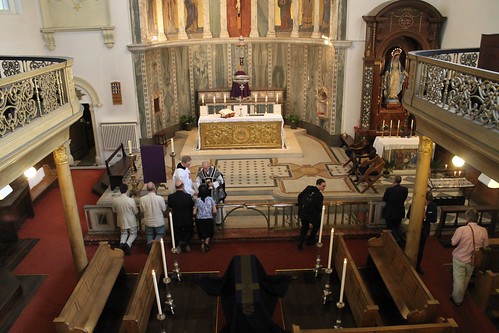 |
| Requiem for Michael Davies organised by the LMS last year, in Our Lady of the Assumption, Warwick Street. The celebrant was Fr Tim Finigan. |
Fr Mark Elliot Smith will officiate.
5:30pm, Wednesday 2nd November (All Souls Day)
Our Lady of the Assumption, Warwick Street, W1B 5LZ
Latin Vespers of the Dead, with polyphony (Viadana and Palestrina)

